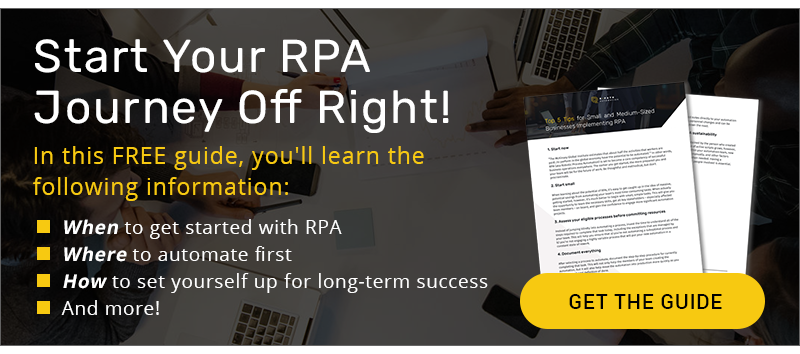Robotic Process Automation (RPA) is a powerful tool that is driving businesses forward in ways that were not possible before. Two distinct types of employees have emerged: people and bots. This development has created new possibilities to improve efficiency, save costs, and ultimately drive revenue.
However, despite your best intentions, introducing RPA can be a touchy subject for employees concerned for their job security. The success of your RPA deployment will depend on clearly communicating with your team, addressing their concerns, and helping them understand the benefits of automation both organizationally and individually.
How to Answer the Question: “Is a Bot Taking My Job?”
While automation has affected blue-collar work for decades, disciplines like RPA are now beginning to impact white-collar work. Savvy business leaders know that they need to think ahead and consider the implications for both their operations and their people.
When it comes to implementing automation, employees often make the leap that it leads to layoffs. However, that does not have to be the case. Instead, it’s important to help your employees understand that RPA can help them reach their full potential and make work more enjoyable. Here are three reasons why:
1. RPA replaces tasks, not jobs.
Most of the immediate opportunity for automation lies in discrete tasks that still require people to perform parts of the overall process. Competitive intelligence collection can be automated, for example, but strategic planning is performed by people. Also, automation opportunities do not neatly replace whole jobs. Automating bank account reconciliation may eliminate the need for a human to perform this tedious and time-consuming task, but finance and accounting roles are not replaced in the process.
2. Automation enables teams to achieve more and do more meaningful work.
Automation is not just about cost savings; it’s also about increasing productivity. At least one study suggests that the companies facing the first wave of office work automation are redeploying employees rather than replacing them in most situations.
In fact, once bots have been trained to complete a specified task, they become a virtual extension of your team. This, in turn, means that your employees have more time to engage work better aligned with their human potential – work that requires creativity, imagination, judgment, and relationships. In addition, by offloading rote tasks, bots give human workers the time to develop new skills and increase their value within the organization.

3. Automation is most successful with humans in the loop.
Human insight is extremely valuable to a successful RPA deployment. In a 2020 study, McKinsey indicates that the companies that successfully implement RPA put as much focus on their people as they do on the technology. One example is, “…using ‘human in the loop’ solutions – that is, training automation platforms with people’s input over time”
How to Start Preparing Your Team Now
Automation will absolutely play a role in the future of all white-collar work, and leaders that take the initiative to prepare their teams for this change now will have an edge in the years ahead.
If you’re not sure where to begin, start by asking questions like the following:
- What tedious, repetitive tasks could be automated, and which team members will be affected?
- What higher-order tasks or projects will you be able to assign to team members with increased availability, and how can you effectively upskill them?
- How will you clearly communicate your automation strategy, and how will you ensure your team is engaged from the start?
Be sure to include affected employees in the process of answering these questions. As the people closest to the actual work, they will offer a valuable perspective as you define how and where to use bots to automate and improve current processes. Furthermore, when their voices are heard and they feel like a part of the solution, your employees will be more engaged and invested in its success.
Work is Changing
Automation will eventually translate into workforce reductions. Work will change. That said, organizations that create new assignments that are designed explicitly for human talent – requiring creativity, imagination, judgment, and relationships – will contribute to a better work life for their people, improve employee engagement, and ultimately outperform their peers.
Ready to Introduce RPA to Your Team?
At R-Path Automation, we believe that every employee should be focused on creative, meaningful, high-ROI work that moves the business forward rather than wasting time on tedious, manual tasks. Contact us today to learn how to make that happen!

